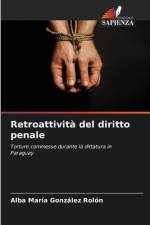von Alba María González Rolón
39,90 €
Wir müssen uns auf die Verjährung in Strafsachen beziehen, die eine Grenze des ius puniendi darstellt, eine Grenze, die von den Staaten selbst gesetzt wird. Die Verjährung kann nicht als ein Recht des für eine Straftat Verantwortlichen verstanden werden, sondern als eine Selbstbeschränkung der Strafgewalt des Staates. Diese Feststellung zeigt sich darin, dass die Verjährung für den Beschuldigten nicht abdingbar ist, da die politisch-strafrechtlichen Gründe für die Verjährung einer sozialen Ordnung über dem Interesse des Beschuldigten stehen, seine Unschuld zu beweisen. In der Praxis ist die Verjährung ein Institut, das die Verantwortung, die sich aus der Begehung einer Straftat ergibt, durch den Ablauf einer bestimmten Zeitspanne, die das Recht des Staates, die Strafe zu verhängen, beendet, freisetzt. Sie ist eine Ursache für das Erlöschen der strafrechtlichen Verantwortung, die nach der Begehung der Straftat eintritt und sich über die Strafe erstreckt. Die Nichtanwendbarkeit von Verjährungsfristen lässt sich sehr gut mit der Auffassung erklären, dass das Strafrecht ein notwendiges Instrument zur Aufrechterhaltung einer bestimmten sozialen Ordnung ist, wenn es sich um Verbrechen wie die gegen die Menschlichkeit handelt, da ihre Verfolgung und Bestrafung so lange notwendig ist, wie die Täter am Leben sind.




